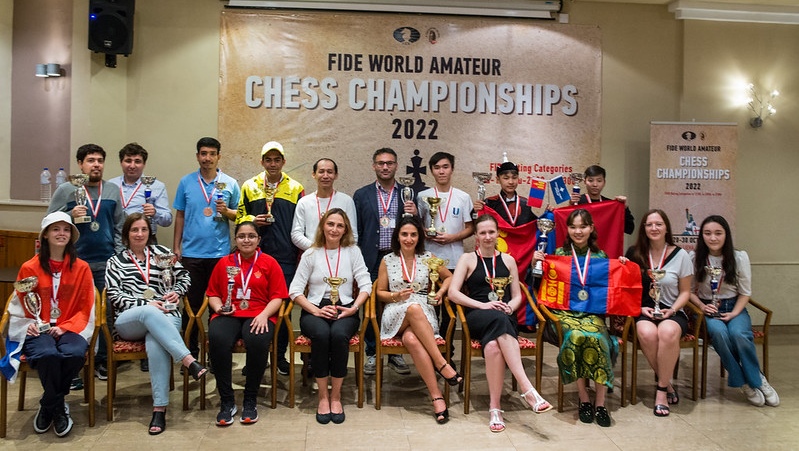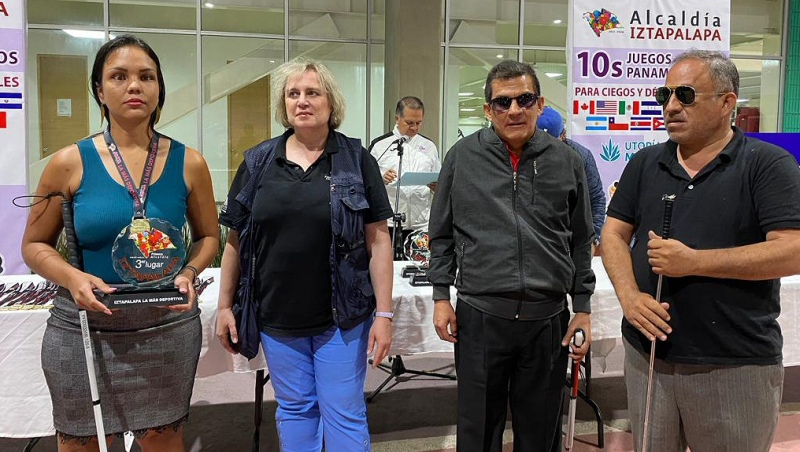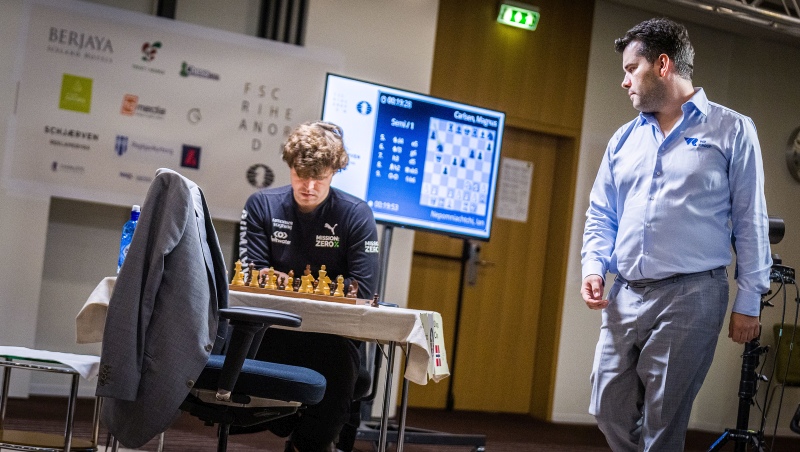Winners crowned at 2022 FIDE World Amateur Championship

The 2022 FIDE World Amateur Championship is in the books. The event took place in Malta from October 20-30 and was held in four sections: U2300, U2000, U1700 and Women U1700. Women playing in the open sections U2300 and U2000 were eligible to win prizes from both categories. All the competitions were 9-round Swiss tournaments with classical time control. In the Open U2300 section, it all came down to the final round. Abilmansur Abdilkhair from Kazakhstan (pictured below) scored a very important victory over Colombian Juan David Becerra and claimed gold with 7.5/9. Abilmansur improved his result compared to the 2021 FIDE World Amateur Chess Championships, where he finished second in the same section. Naranbold Sodbilegt (number 46 on the starting list) (pictured below) was the sole leader in the Open U2000 from start to finish – the 13-year-old Mongolian took gold with a perfect 9 out of 9. Two players tied for first place in U1700, with Soninbayar Tuguldur of Mongolia (pictured below) claiming gold thanks to better Buchholz over Aleksandr Martynov (FIDE), who had to settle for silver. The 13-year-old winner was number 50 on the starting list. Meri Grigoryan (England), Julia Gorozhankina (Latvia) and Nino Kordzadze (Austria) scored 3.5 points out of 9 and became the top-rated women in the Open U2300 section. They took gold, silver, and bronze in the Women U2300, respectively. Margarita Baliuniene of Lithuania finished ninth out of 75 players in the Open U2000 section and secured gold in the Women U2000. In the Women U1700, Margadgua Erdenebayar from Mongolia (pictured below) won the title with a round to spare, scoring 8.5 points out of 9. Margadgua said she started playing chess by chance while in the hospital. But now she is determined to tie her life with chess: “This year, I want to become a FIDE master, and in the future, my goal is to become a grandmaster.” Final standings: Open U2300 1. Abilmansur Abdilkhair (Kazakhstan) 2. Zhuban Bigabylov (Kazakhstan) 3. Juan David Becerra (Colombia) Open U2000 1. Naranbold Sodbilegt (Mongolia) 2. Matias Hurtado Bahamonde (Chile) 3. Aasef Alashtar (France) Open U1700 1. Soninbayar Tuguldur (Mongolia) 2. Aleksandr Martynov (FIDE) 3. Farhaan M (India) Women U2300 1. Meri Grigoryan (England) 2. Julia Gorozhankina (Latvia) 3. Nino Kordzadze (Austria) Women U2000 1. Margarita Baliuniene (Lithuania) 2. Helen Montiel Caceres (Paraguay) 3. Anna Andrzejewska (Poland) Women U1700 1. Margadgua Erdenebayar (Mongolia) 2. Arailym Alipbek (Kazakhstan) 3. Guruprasad Amulya (India) Some participants of the 2022 FIDE World Amateur Championships went to Malta hoping to win trophies, but the majority came to the tournament simply because they love the game and enjoy playing chess. Sara Brenska from Poland (pictured below) shared her story: “I started to play chess two years ago after watching ‘The Queen’s Gambit’ on Netflix. That’s how it all started. I am an intern at an international company in Poland, and I deal with taxes and accounting. I want to be better at chess, but honestly, I play it just for fun. I don’t have specific chess ambitions; I just want to play better.” Lithuanian Jonas Vaskevicius (pictured below, left) briefly explained why he is in Malta: “I am a lawyer, and two years ago, I started to work less; I had some free time. I thought that people should have some hobbies and for me, it is interesting to play chess. It is a good activity; I like spending my time playing chess. Participating in this Championship is nice, and I think everyone would like to do it, but the main goal is to enjoy the game”. According to tournament director Nikolaos Kalesis, this year, a record number of foreign players came to Malta to participate in the Championships. In total, the event brought together 197 players from 51 federations, including 27 title-holders. The FIDE World Amateur Chess Championships were held in the 4-star Conference Hotel “Paradise Bay Resort”, 30 km north of Malta International Airport, on the northern seaside of Malta Island from October 20-30. This year the prize fund was increased to €15,000 – from €10,000 last year. Photos: Andreas Kontokanis flickr.com/photos/karpidis/albums/72177720303080598 Official website: malta2022.net/ Complete results: chess-results.com/tnr669871.aspx?lan=1&art=1&rd=9&fed=FRA&flag=30
10th IBCA PanAmerican Games for Blind set new records

The 10th IBCA PanAmerican Games for the Blind and Visually Impaired took place in Mexico City, Mexico, from October 23-29, 2022. Organized by the IBCA and the Mexican National Network for the Blind with chief organizer Mr Benito Enrique Hernández López, the competition brought together 54 participants representing 13 federations from North, South, and Central America. The players used specialized Braille chess boards, talking clocks, and voice recording equipment. Located at Utopia Meyehualco, part of the Centro de recreación en la Ciudad de México, the playing venue allowed the participants to enjoy excellent playing conditions in outdoor patios protected from sun and wind. On a rest day, the organizers kindly offered free excursions to the Museo Nacional de Arte, the Mexican national art museum that features a unique collection of Mexican art from the mid-sixteenth century, and to the Basílica de Santa María de Guadalupe, an outstanding social and cultural phenomenon that receives more than 20 million pilgrims every year, making it the most visited Marian precinct in the world, surpassed among the Catholic shrines only by Saint Peter’s Basilica. Titles and medals were contested in four categories. The Totally Blind / Women section witnessed the triumph of Columbian ladies: Gold Medal Yolima Franco Perez (COL) Silver Medal Maribel Yepes Bermudez (COL) Bronze Medal Leidy Tatiana Contreras Sandoval (COL) Similar domination was demonstrated by Columbian players in the Totally Blind / Open section: Gold Medal Fredy Alexander Jaimes (COL) Silver Medal Saulo de Jesus Torres (COL) Bronze Medal Fernando Daza Samboni (COL) In the Visually Impaired / Women section, the trophies went to representatives of three different countries: Gold Medal Leidy Johanna Bautista Chiquillo (COL) Silver Medal Jessica T. Lauser (USA) Bronze Medal Eunize Nikol Espinosa Toala (ECU) Finally, in the Visually Impaired / Open section, two players from Venezuela made the podium: Gold Medal Harlen Jose Otero Munelo (VEN) Silver Medal Henry Monterrey (VEN) Bronze Medal John Mike Rosales (COL) The closing ceremony on October 29th featured Ms Clara Brugada Molina, Mayor of Iztapalapa, Ciudad de Mexico; Ms Diana Tsypina (Canada), IBCA 2nd Vice-President; Mr Fernando Daza Samboni (Columbia), IBCA Continental Representative for the Americas; Ms. Yolanda Nuñez, Secretary General of the Mexican National Network for the Blind (RENAC México); Mr Javier Pelalta, Head Principal of Sports; Ms Diana Elizabeth Taylor Sanchez, Head of Linguistic Services; Ms Lidia Rodriguez, Secretary of Inclusion and Wellness; authorized representatives of municipal agencies in charge of tourism and the affairs of the disabled. The ceremony started with a live rendition of the Mexican anthem and continued with traditional songs and dances performed by Iztapalapa artists. Then, Mayor Clara Brugada Molina thanked all participants and officials for coming to Mexico City and reminded them of the rich history of the place that was founded by the Aztecs as Tenochtitlan. For seven days, the most populous city in North America opened its heart to disabled players. She highlighted the excellent collaboration between the IBCA, the organizers, and local authorities that made it possible for the participants to meet in Iztapalapa in person and enjoy chess. The IBCA 2nd Vice-President Ms Diana Tsypina thanked the authorities of Mexico City and Iztapalapa, the local organizers, and the IBCA América Board members for all the hard work they put into this important competition. Fair play and good sportsmanship were shown by everyone. The event set new participation records both in the number of players and the number of federations represented. Ms. Tsypina reminded the audience that such a well-attended PanAmerican competition was yet another milestone in executing the IBCA strategic development plan for 2021-25. The IBCA and its national members – the organizations specifically established for the promotion of Braille chess for the blind and visually impaired – productively work in with respective countries’ governments, NGOs, national Paralympic Committees, the International Blind Sports Federation, FIDE, and other international associations as partners respecting each other’s core areas of expertise and advancing the goals set in the United Nations Convention on the Rights of Persons with Disabilities, the EU Charter of Fundamental Rights, and similar documents. Chief Arbiter Gustavo Vargas Cortez announced the official results. The dignitaries presented the players with medals and trophies. The winners were met with huge applause. The national anthems of Columbia and Venezuela were played. The next IBCA PanAmerican Games will be held in Guatemala. The International Braille Chess Association (IBCA) is the supreme body responsible for chess for the blind and visually impaired. The IBCA is part of the International Blind Sports Federation and an Affiliated Member of FIDE. Founded in 1958, the IBCA has grown to more than sixty countries on four continents. Its major competitions include the Blind Chess Olympiad and the Blind World Chess Championships. Information and photos are provided by the IBCA América, the Mexican National Network for the Blind, and Alcaldía Iztapalapa.
FIDE World FR Championship: Carlsen crashes out, Nakamura downs prodigy to set up surprise final

Ian Nepomniachtchi gained Fischer Random revenge for his unsuccessful classical title challenge against Magnus Carlsen last year, and immovable object Hikaru Nakamura toppled the irresistible force of the preliminaries, Nodirbek Abdusattorov, to set up a title match few predicted. Nakamura, the only undefeated player in the event, eliminated Abdusattorov with a shocking 3-0 sweep, while Nepomniachtchi won three in a row after dropping the first game in a very nervy clash with Carlsen. The day’s play The knockout segment in the FIDE World Fischer Random Chess Championship produced the title finalists from two intriguing semifinal match-ups. Reigning classical chess world Magnus Carlsen faced his previous challenger for that title, Ian Nepomniachtchi, in one of the best-of-four, two mini-match duels. Reigning World Rapid Chess Champion, the Uzbekistan teenage prodigy Nodirbek Abdusattorov, who had shown awesome form in the preliminary group stage, met the well-known master of both this variant, but also all forms of speedier chess – US Grandmaster Hikaru Nakamura. Carlsen was the last to arrive as the players gathered for the unveiling of the first position of the day, as well as another drawing of lots. Chief Arbiter Omar Salama concealed a different colored pawn in each fist and asked first Carlsen, and then Nakamura, to choose a hand. Carlsen picked one with black, meaning he will play this color in games 1 and 4, while Nakamura did the opposite. This ritual guarantees that the players will get both sequences of color in the mini-matches. Start position 1 Salama said that he reckoned that getting to play white in the final game could be a small advantage in a must-win situation – though it must be stressed that given the embryonic state of opening knowledge in Fischer Random, the statistical advantage of who moves first is harder to measure. Today’s ceremonial first moves were played by a pair of six-year-olds, Aria Björk and Thor Gudni, representing their preschool Laufasborg. Salama has been teaching chess there for 15 years and explained Laufasborg’s unusually rich chess tradition, which has been covered in several international TV news documentaries. “The chess room there is named after (Iceland’s first Grandmaster) Fridrik Olafsson, who visits it often on his birthday, 26th of January – which is the chess day of Iceland.” All kinds of excitement The two games quickly burst into action, with everyone ready to take risks and with complicated and fluctuating battles on both boards. Nepomniachtchi appeared to be on the brink of defeat after giving Carlsen a chance to attack, but his much quicker rate of play soon began to elicit errors from the Norwegian. Carlsen appeared to miss a clear win when down to his last seconds to complete the first 30 moves. This meant the battle flared up again, but now with Nepomniachtchi also beginning to run short of time. A thrilling slugfest lasted until the final seconds, with Carlsen extracting the full point in dramatic fashion, which was greeted by spontaneous applause from the audience. “It was exciting for me too, I understood early that I was going to be under time pressure… In the end, it was a bit messy, a bit random,” Carlsen said. Veteran versus teen The other match had no lack of drama, with Abdusattorov playing with the mix of aggression and optimism that has fueled great results in Reykjavik so far. He seemed to have gained the upper hand quickly, but Nakamura is a master of clever and complex defending. He conjured up a tricky concept and turned the tables when this wily idea punished an overoptimistic decision from his opponent. “Probably I was losing at one moment, but when he allowed this (material) imbalance it was just too easy for me to play,” Nakamura explained. Nakamura turned a material imbalance into a material superiority and won smoothly. Things change quickly in a knockout event. Abdusattorov had dominated his preliminary group and impressed with his smooth attacking play, but now he had to show that can fight back against one of the craftiest of Fischer Random players. Return games Einar S. Einarsson, former President of the Icelandic Chess federation and honorary member of FIDE, made the first move in the second game of the day. The Carlsen-Nepomniachtchi game followed a similar script, the latter playing provocatively and very quickly, while Carlsen again risked serious time shortage while trying to work out the complicated critical variations. Carlsen has been plagued by an unusually high number of serious oversights in the event, and here he stumbled again while trying to refute his opponent’s quick and risky approach. Despite the blunder, Nepomniachtchi was forced to work surprisingly hard to overcome Carlsen’s grim resistance, and he looked both relieved and annoyed when he finally evened up the match. Experience still counts for something in a youthful world, and Nakamura produced an extremely smooth performance to take a surprising 2-0 lead over the man no one wanted to play. Wesley So had some success vs. Abdusattorov in the preliminaries by trying to avoid the sharp, complex positions where the youngster had been so deadly, and Nakamura took a leaf out of this book, exchanging queens early and methodically outplaying his rival in the much more sedate type of position that arose. A newish start The second half of the matches would be played from a new position. Now the tension was more evident, with the players eager to hurry off and try to plot some opening strategy. Abdusattorov was unable to concentrate enough to give a reaction to Norwegian TV, finally just shrugging apologetically and saying he had nothing to add. Starting position 2 The tension may also have been related to what they got – players have muttered darkly whenever they see knights in the corner. This time Carlsen and Abdusattorov would begin their mini-matches with the white pieces. In the initial phase of play both of them appeared to emerge with small advantages, though Abdusattorov’s vs. Nakamura was far more chaotic. Carlsen decided to go pawn

